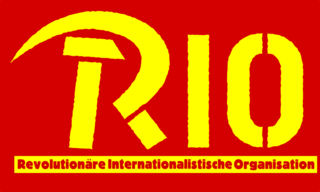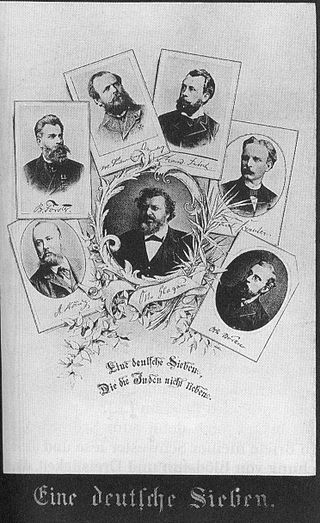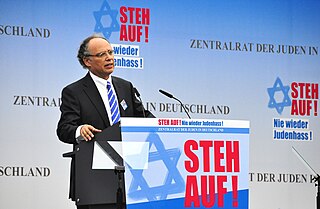
Anti-German is the generic name applied to a variety of theoretical and political tendencies within the left mainly in Germany and Austria. The Anti-Germans form one of the main camps within the broader Antifa movement, alongside the Anti-Zionist anti-imperialists, after the two currents split between the 1990s and the early 2000s as a result of their diverging views on Israel. The anti-Germans are a fringe movement within the German left: In 2006 Deutsche Welle estimated the number of anti-Germans to be between 500 and 3,000. The basic standpoint of the anti-Germans includes opposition to German nationalism, a critique of mainstream left anti-capitalist views, which are thought to be simplistic and structurally antisemitic, and a critique of antisemitism, which is considered to be deeply rooted in German cultural history. As a result of this analysis of antisemitism, support for Israel and opposition to Anti-Zionism is a primary unifying factor of the anti-German movement. The critical theory of Theodor Adorno and Max Horkheimer is often cited by anti-German theorists.

Matthias Küntzel, is a German political scientist and historian. He was an external research associate at the Vidal Sassoon Center for the Study of Antisemitism (SICSA) at the Hebrew University of Jerusalem from 2004 to 2015. Currently, he is a member of the German Council on Foreign Relations DGAP, of the German Historical Association (VHD), of the Association for the Study of the Middle East and Africa ASMEA and of the advisory board of UANI.

Tuvia Tenenbom is an Israeli-American theater director, playwright, author, journalist, essayist and the founding artistic director of the Jewish Theater of New York, the only English-speaking Jewish theater in New York City. Tenenbom was called the "founder of a new form of Jewish theatre" by the French Le Monde and a "New Jew" by the Israeli Maariv. Tenenbom is also an academic, having university degrees in mathematics, computer science, dramatic writing and literature.
Secondary antisemitism is a distinct form of antisemitism which is said to have appeared after the end of World War II. Secondary antisemitism is often explained as being caused by the Holocaust, as opposed to existing in spite of it. One frequently quoted formulation of the concept, first published in Henryk M. Broder's 1986 book Der Ewige Antisemit, stems from the Israeli psychiatrist Zvi Rex, who once remarked: "The Germans will never forgive the Jews for Auschwitz." The term was coined by Peter Schönbach, a Frankfurt School co-worker of Theodor W. Adorno and Max Horkheimer, based on their critical theory.

The Revolutionary Internationalist Organization (RIO) is a political group in Germany advocating for the dissemination of socialist and internationalist ideas. It is the publisher of the online newspaper Klasse Gegen Klasse and part of the international newspaper network La Izquierda Diario. The RIO aims to achieve societal changes toward a classless society and supports social movements internationally. Its ideology is based on Marxist, Trotksyist, and internationalist principles.

Hajo Meyer was a German-born Dutch physicist, Holocaust survivor and political activist. While primarily known for his public commentaries in terms of the European Jewish community, he is also noted for his work directing the facility Philips Natuurkundig Laboratorium for many years.

Wolfgang Benz is a German historian and anti-semitism researcher from Ellwangen. He was the director of the Center for Research on Antisemitism of the Technische Universität Berlin between 1990 and 2011, and is also a member of the advisory board for the Memorial to the Murdered Jews of Europe and was involved in the memorial's design. He has written or published over 200 works. He is considered to be one of the most renowned and well-known historians in modern Germany, and one of the foremost scholars on anti-semitism studies. He has been referred to as the "doyen" of anti-semitism research.

Alfred Grosser was a German-born French writer, sociologist and political scientist. Although his Jewish family had to move from Frankfurt to France in 1933, he focused on Franco-German cooperation after World War II, was instrumental in the Élysée Treaty in 1963, and writing books towards better understanding between the Germans and the French. He was professor at the Institut d'études politiques de Paris from 1955 to 1995, and contributed to newspapers and broadcasts including La Croix and Ouest-France. He was critical of Israeli politics which caused controversies. His work was honoured with notable awards.

The Berlin movement was an anti-Semitic intellectual and political movement in the German Empire in the 1880s. The movement was a collection of unassociated individuals and organizations.

Gerhard Zwerenz was a German writer and politician. From 1994 until 1998 he was a member of the Bundestag for the Party of Democratic Socialism (PDS).
Stefanie Schüler-Springorum is a German historian.
Werner Bergmann is a German sociologist. He is Professor of Sociology at the Center for Research on Antisemitism at the Technical University of Berlin.
Chosen and Excluded – The Hate on Jews in Europe is a German and French documentary film from Joachim Schroeder and Sophie Hafner about Antisemitism in Europe, the Middle East and inside the Muslim Community. It was commissioned by the public Franco-German TV network ARTE in 2015. It got attention in German and international media after the initial refusal of the two public TV networks ARTE and WDR to release the film. Both claimed the documentary did not live up to their standards. During the ongoing public discussion, the German tabloid Bild decided to show the documentary online for 24 hours without having the rights. Eventually, both, ARD and ARTE, broadcast the documentary on June 21, 2017.
Mario Keßler is a German historian.
Antisemitism is a growing problem in 21st-century Germany.

Dieter Graumann is an Israeli/German jurist and economist. From 28 November 2010 to 30 November 2014, he was President of the Central Council of Jews in Germany and has been Vice President of the World Jewish Congress since 6 May 2013. He succeeded Charlotte Knobloch in both positions.
The "Jewish parasite" is a notion that dates back to the Age of Enlightenment. It is based on the notion that the Jews of the diaspora are incapable of forming their own states and would therefore parasitically attack and exploit states and peoples, which are biologically imagined as organisms or "peoples bodies". The stereotype is often associated with the accusation of usury and the separation of "creative", i.e. productive, and "raffling", non-productive financial capital.
Ronen Steinke is a German political journalist and author whose essays and books on issues of law and society have been discussed in The Times, The Guardian, Haaretz, De Volkskrant, Le Figaro, The Asahi Shimbun and The New York Review of Books. In 2013, Steinke published the biography of the German-Jewish prosecutor Fritz Bauer, who secretly worked with the Mossad and brought Nazi war criminals to justice in the 1960s. The book, which received a preface by the President of the German Supreme Court, inspired the award-winning 2015 film The People vs. Fritz Bauer.

Harry Weibel is a German historian. His main topics are neo-Nazism, right-wing extremism and antisemitism in the GDR and racism in Germany from 1945 to the present.
Monika Schwarz-Friesel is a German cognitive scientist, professor at the Technical University of Berlin and one of Europe's most distinguished antisemitism researchers according to Marc Neugröschel from the newspaper The Times of Israel. She is often interviewed by media outlets like Haaretz, Der Standard or Der Tagesspiegel on her research on current forms of antisemitism, which often take place on the internet.












